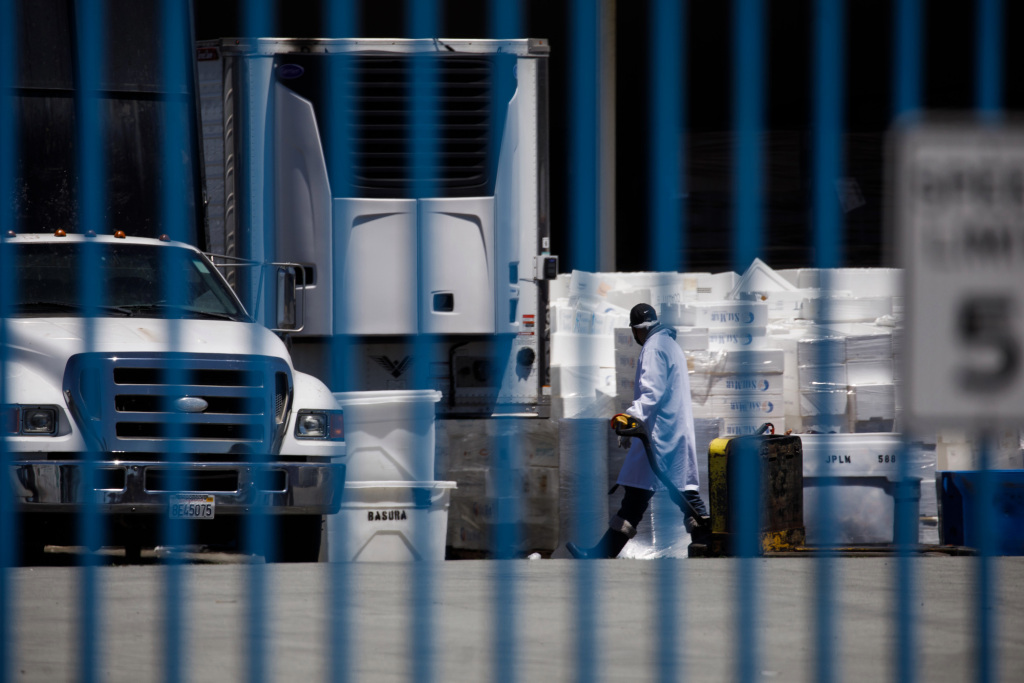The overwhelming majority of Bay Area workplaces that reported COVID-19 outbreaks never faced any enforcement actions for possible violations of public health orders, a Bay Area News Group analysis reveals.
The Bay Area counties that actively enforced COVID-19 orders — and not all counties did — primarily policed businesses that drew customer complaints, public records and interviews with officials indicate. Under state rules, these counties were also collecting information about workplace outbreaks but rarely used that information to investigate potential violators.
And in Santa Clara County, which had the state’s most robust enforcement of public health orders, officials intentionally avoided issuing fines to some workplaces that had outbreaks — a decision they insist was necessary to encourage businesses to report and help contain viral hotspots.
As a result, stores and restaurants that drew the ire of customers for violations such as failing to post social distancing guidelines sometimes faced thousands of dollars in fines. But employers that failed to enforce mask rules and other critical orders — and saw COVID spread among their employees — could avoid disciplinary action.
The disparity strikes some employers as vastly unfair.
“How are you going to tell me that my fines are justified when we had people with literal outbreaks that couldn’t get shut down or fined?” said Freddie Jackson, owner of San Jose’s Enso nightclub, who was fined more than $40,000 for social distancing violations although he says he knows of no employees or customers who got COVID at his bar.
The news group’s analysis shows:
- In Santa Clara County, 264 COVID-19 outbreaks were reported over the past year but only 14 worksites were fined. The county issued a total of more than 650 notices of fines to businesses between August 2020 and March 2021– nearly all of them to businesses where no outbreaks had been reported.
- In San Mateo County, 112 outbreaks were reported at businesses, but none of them were fined; by comparison, the county issued 41 notices of fines to businesses, none of which had outbreaks. In Contra Costa County, no fines were issued to the 22 businesses that reported outbreaks, while 53 notices of fines were given to businesses with no reported outbreaks.
- Compounding the disparity, Cal/OSHA, the primary workplace safety regulator at the state level, also lagged in targeting businesses with outbreaks — it cited just 12 workplaces that reported outbreaks for COVID-19 violations across the three counties. Eight were in Santa Clara, ranging from a Los Altos supermarket to a waste-sorting facility in San Jose. Cal-OSHA has been criticized for lax enforcement of COVID safety risks across the state.
Experts who reviewed the news group’s data said it illustrates a failure to target enforcement where it is most needed to ensure public safety.
“Over time, in a pandemic, what that means is you’re not really identifying the bad actors in the environment or protecting the workers in the environment — and you’re contributing to the spread, and ultimately not achieving your goal,” said Dr. Kirsten Bibbins-Domingo, an epidemiologist with UCSF.
The analysis is based on data generated under a state law that took effect in January, requiring counties to track workplace outbreaks — defined as three or more employees testing positive for COVID-19 within a two-week span. Reporters requested workplace outbreak data from all 61 public health departments in the state this spring, but only about a third have provided responsive records to date.
In the Bay Area, only Santa Clara, San Mateo, Contra Costa and Marin counties provided complete records, while Alameda and San Francisco Counties, among others, have resisted disclosures that might help workers in those counties assess dangerous conditions. The four counties that disclosed records have generally taken a more aggressive stance: They also adopted new laws in the summer of 2020 authorizing public health officers to levy fines against businesses and individuals that violated public health orders, though Marin largely delegated that responsibility to its cities.
But while those counties assembled enforcement teams to police violations, they mostly kept the teams away from workplaces with outbreaks — an intentional decision made to ensure businesses’ cooperation, county officials in Santa Clara and San Mateo said. Instead, public health workers responded to reports of outbreaks, working with the businesses in hopes of tracing and then containing the spread of the virus.
A Contra Costa spokesperson confirmed that “public health staff who respond to outbreaks did not have a role in the enforcement of health orders” in that county as well, but did not respond to follow-up questions about its reasoning.
Civil enforcement officers in all three counties levied fines against mom-and-pop restaurants, beauty salons and fitness studios where there were no outbreaks. The reason? Those are the sorts of businesses whose infractions were flagged by their customers.
Although county officials noted that employees were also told to submit complaints, Bibbins-Domingo said that workers are often afraid to speak up against their employers, and such systems are generally not set up to encourage it. That leaves factories, construction sites, and the staff-only areas of big-box warehouse stores without the scrutiny that consumer-facing businesses receive.
“When you build in the economic inequalities — or that customers feel more empowered to do anything compared to those in a work environment — then you realize it’s grossly inequitable,” Bibbins-Domingo said.

The phenomenon was perhaps most glaring in Santa Clara County, which deployed the strictest civil enforcement tactics of any county in the region. Businesses in Santa Clara County were more than 13 times more likely to get slapped with a COVID fine than those in San Mateo and Contra Costa counties. But if a business had an outbreak, enforcement teams mostly stayed away.
“You wouldn’t want to have enforcement introduced into that conversation, because that would be completely at odds with the ability to be successful with case investigation contact tracing,” said Santa Clara County Counsel James Williams. “…If (a business) is going to get fined in a case investigation, then you’re not going to get the information you need to break the chain of transmission.”
Williams said the enforcement team only got involved with an outbreak investigation if a business failed to cooperate. When asked how often that happened, Williams said, “I cannot quantify it.”
Countywide, at least 19 worksites experienced multiple outbreaks. The largest single outbreak comprised 51 cases at an Olympus America site in San Jose in January, while a Morgan Hill fishpacking plant, Lusamerica Foods Inc., reported 39 cases last May and another 14 in February, records show.
In a statement to this news organization, an Olympus America spokesperson said that the county never pointed out problems with protocols at its San Jose facility and that the company’s contract tracing system only indicated one case of employee-to-employee transmission.
Of course, reporting an outbreak did not mean that a business had violated any protocols such as social distancing or masking. County officials emphasized that some outbreaks stemmed from infections spreading outside of the workplace, although they could not say how many.
Yet even when public health investigators did discover problems, the businesses often were not fined: Lusamerica, for instance, avoided fees because it changed protocols at the facility, said County Executive Jeff Smith. Neither Smith nor Lusamerica responded to follow-up questions about what those protocol changes entailed.
In December of last year, California’s workplace safety regulator Cal/OSHA fined Lusamerica nearly $17,000 for alleged violations dating back to last spring’s outbreak such as failing to enforce physical distancing between workers, screen them for symptoms or implement physical barriers, records show.
The lack of enforcement at workplaces that reported outbreaks struck a sour note for some of the hundreds of business owners in Santa Clara County who felt they were unfairly fined by enforcement officers, in some cases without any warning or grace period to correct their mistakes before being ordered to pay up.
Jackson’s Enso Nightclub, for instance, was fined $43,000 in November 2020 for violations including inadequate separating of tables, playing televisions when prohibited and failing to display up-to-date signage regarding capacity limits. Jackson is fighting the fines, and said the news group analysis reinforces his conviction that the county’s attention was focused on the wrong places.
“These are just the blood-boiling statistics that you almost wish you didn’t hear because we’re still fighting fines as we speak,” he said.

It was a similar story in San Mateo and Contra Costa counties, where public health investigators generally did not refer outbreak locations to enforcement teams.
Records show that Contra Costa’s biggest single outbreak was 171 cases at a HelloFresh warehouse in Richmond, where workers told this news organization that social distancing was challenging in cramped conditions. San Mateo’s biggest outbreak was 34 cases at a Colma casino last December.
While Contra Costa did not take action against any businesses that reported outbreaks, Cal/OSHA fined the HelloFresh warehouse $8,435 in April 2021 for workplace safety violations, including not requiring masks on the assembly line and in break rooms.
In Contra Costa and San Mateo counties, officials enforced a much shorter list of rules, focusing primarily on businesses serving customers indoors when prohibited, restaurants defying the outdoor dining ban and those failing to abide by social distancing and capacity requirements, and tended to issue smaller fines than Santa Clara County.
Contra Costa Health Services spokesperson Karl Fischer said that instead of issuing fines immediately, the county’s public health department tried to educate businesses, including those that experienced outbreaks. Health officials recommended policy changes to better protect workers and customers and checked back regularly to assess the progress of the outbreak until it stopped spreading, he said.
But to Jim Araby, a union representative for United Food and Commercial Workers Local 5, it seemed that officials who were attempting to keep industries running while protecting workers could “never find the right balance.”
“What this says about workplace safety is that there are tens of thousands of people who work behind closed doors who are not getting the same treatment as those that are facing customers,” he said.
“We don’t value people that we can’t see.”










